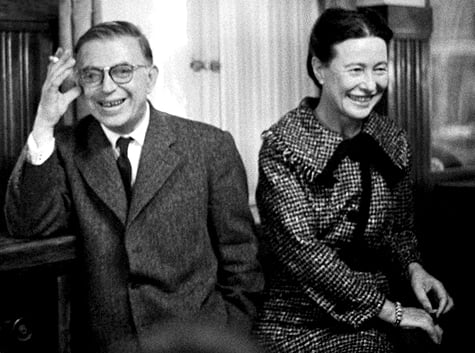She Came to Stay by Simone de Beauvoir
By Nava Atlas | On March 20, 2018 | Updated December 3, 2020 | Comments (0)

She Came to Stay by Simone de Beauvoir was originally published in France in 1943 as L’Invitee. The autobiographical, philosophical novel was based on de Beauvoir’s open relationship with Jean-Paul Sartre, and takes place just before and during World War II.
The novel’s main character, Françoise, is based on de Beauvoir herself, and Pierre is a thinly veiled Sartre. A younger woman, Xaviere, enters their lives as they form a ménage a trois. Xaviere is a mash-up of sisters Olga and Wanda Kosakiewicz.
The novel explores themes of freedom, dependence, sexuality, and the other. In addition to the trials and tribulations of love and complex relationships, the story incorporates elements of existentialism, the philosophy that embraced by de Beauvoir and Sartre. Central to this philosophy is finding the meaning of life and self through free will, choice, and personal responsibility.
She Came to Stay wasn’t published in the U.S. until 1954 in its English translation. At that point, de Beauvoir had become known for the book that would come to define her — The Second Sex — considered a feminist classic since it first saw print. Below is an American review of She Came to Stay that recognizes its multifaceted layers as a work of fiction and as a roman a clef.
. . . . . . . . . .
Simone de Beauvoir and Jean-Paul Sartre: An Existential Love Story
. . . . . . . . . .
She Came to Stay — a 1954 review
From the original review of She Came to Stay by Simone de Beauvoir (1954) in the Albany Democrat-Herald, March, 1954. Translated from the French.
When Simone de Beauvoir’s The Second Sex was published, it blew up a storm among reviewers — male reviewers mostly … This attention to Simone de Beauvoir had its value — it has resulted in the publication of her novel, She Came to Stay, titled L’Invitee in the original 1943 Paris edition, one of the best of the French war era and still the most original Existential novel, rivaling Sartre’s Nausea.
A line from Hegel introducing the novel, “Each conscience seeks the death of the other,” is the philosophical key to the physical problem. That problem is the oldest of all — the triangle, Pierre and Françoise, people of the theatre, and Xaviere from Rouen.
The three live in love as one, suffering. Gerbert, an actor, comes in as an intermission for both Françoise and Xaviere. It’s Françoise’s story. Intelligent and beautiful, honest with herself and others, she accepts Pierre’s relationship with Xaviere, accepts the shallow Xaviere into her liaison. She has esteem for Pierre, he has respect for her.
. . . . . . . . . .
She Came to Stay on Bookshop.org*
She Came to Stay on Amazon*
. . . . . . . . . .
The needs of love
“You don’t realize it,” she said, “and that’s not surprising. You’ve so set your mind on this love of ours, that you’ve put it in safekeeping, beyond time, beyond life, beyond reach. From time to time, you think about it with satisfaction, but what has actually become of it, you never look to see.” She burst into sobs. “But I — I want to look.”
Xaviere, enamored with Parisian ways, can be nothing but unpredictable, capricious. She has “red peasant’s fingers,” beautiful wrists. Pierre is male, competent, a master in the theater and encompasses both women. With psychological sharpness, the author displays the conflict, the three pitted against each other yet unable to split up.
Simone de Beauvoir’s scalpel never hesitates as it cuts through layer after layer. Her lines are dramatic, though never overwrought; her people breathe and talk as in life they must.
No philosophical asides are thrust in, although the theme is straight from philosophy — and transferring philosophy to living people and scenes is the most difficult problem a writer may try. The vociferous male reviewers now may take a second look, this time at Simone de Beauvoir, novelist.
. . . . . . . . . .

Philosophical Quotes by Simone de Beauvoir
. . . . . . . . . .
Quotes from She Came to Stay
“All she had to do was make the simplest of gestures — open her hands and let go her hold. She lifted one hand and moved the fingers of it; they responded, in surprise and obedience, and this obedience of a thousand little unsuspected muscles was in itself a miracle. Why ask for more?”
. . . . . . . . . .
“At that moment, there were thousands of women all over the world listening breathlessly to the beating of their own hearts; each woman to her own heart, each woman for herself. How could she believe that she was the center of the world?”
. . . . . . . . . .
“Day after day, minute after minute, Françoise had fled the danger; but the worst had happened, and she had at last come face to face with this insurmountable obstacle, which she had sensed, under vague forms since her earliest childhood.
Behind Xavière’s maniacal pleasure, behind her hatred and jealousy, the abomination loomed, as monstrous and definite as death. Before Françoise’s very eyes, yet apart from her, existed something like a condemnation with no appeal: free, absolute, irreducible, an alien consciousness was rising.”
. . . . . . . . . .
“Alone. She had acted alone. As alone as in death. One day Pierre would know. But even he would only know her act from the outside. No one could condemn or absolve her. Her act was her very own. “I have done it of my own free will. It was her own will which was being fulfilled, now nothing separated her from herself. She had chosen at last. She had chosen herself.”
. . . . . . . . . .

More about She Came to Stay by Simone de Beauvoir
. . . . . . . . . .


Leave a Reply